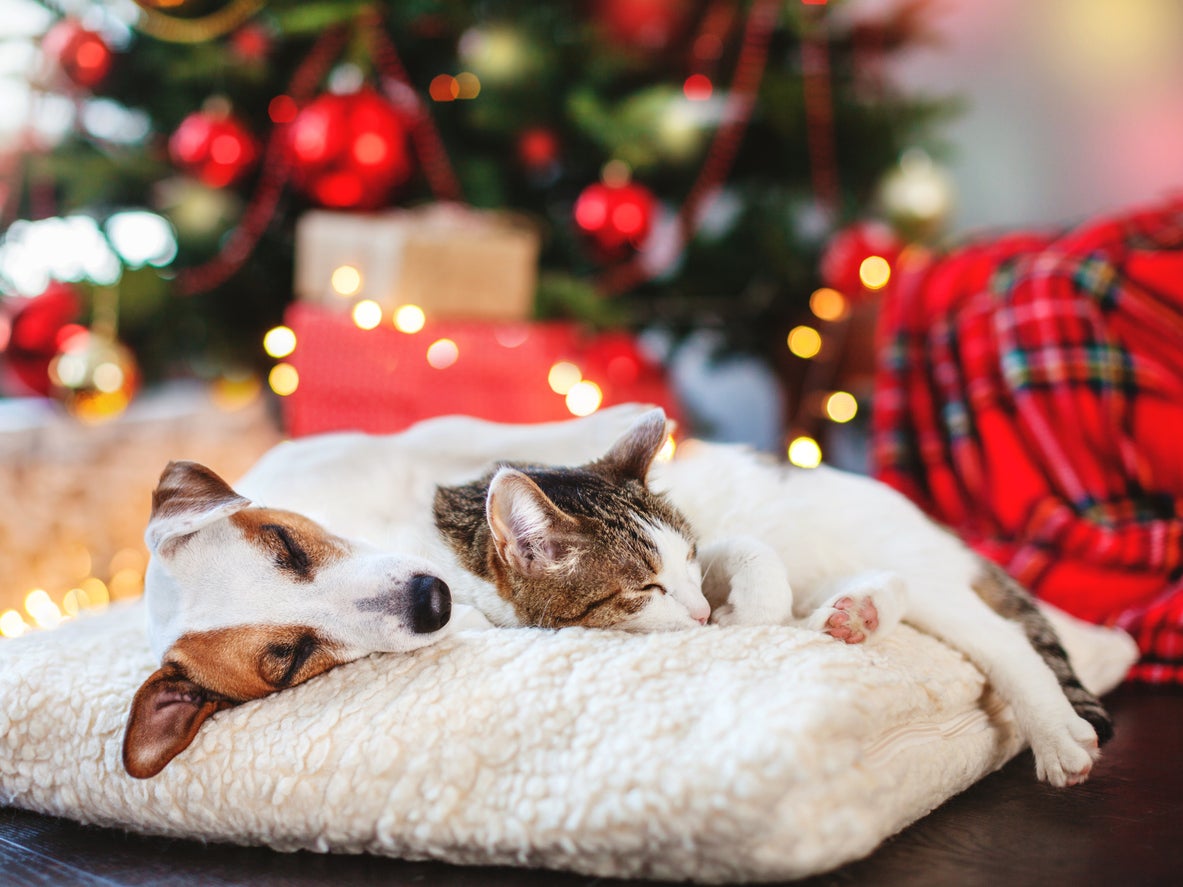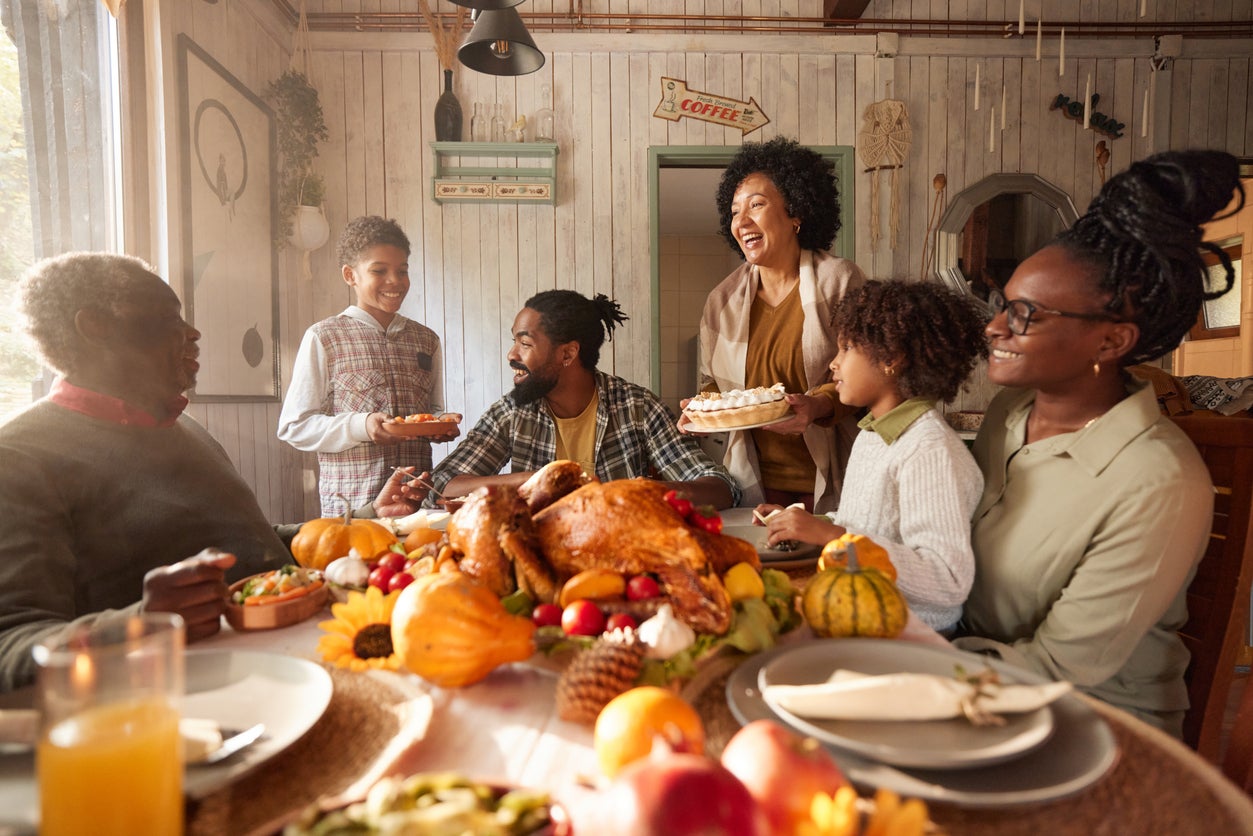- US
- US Money
Turkey bones, fatty foods, sauces, and chocolate can cause serious health issues for pets
J.R. DurenIn JacksonvilleMonday 24 November 2025 18:38 GMTComments
 CloseHere’s what not to feed your pet this Thanksgiving
CloseHere’s what not to feed your pet this Thanksgiving
The latest headlines from our reporters across the US sent straight to your inbox each weekday
Your briefing on the latest headlines from across the US
Your briefing on the latest headlines from across the US
 Email*SIGN UP
Email*SIGN UPI would like to be emailed about offers, events and updates from The Independent. Read our Privacy notice
A Thanksgiving feast offers a chance for families to gather, banter, eat, and, in some cases, slip the house cat a few scraps from piled-high plates. While it may seem like an innocent move, the wrong food could send your furry friend into a flurry of health issues.
Add sauces, turkey bones, fruits, spices, and decorations to the mix, and it’s no wonder that pet insurers tend to see a rise in claims this time of year, Insurify data journalist, Julia Taliesin, told The Independent by email.
“Pet insurance claims tend to spike during the holidays,” Taliesin said. “The holidays have unique threats that aren’t as present outside of the season. Pets may accidentally ingest small bones, toxic foods, or decorations that can cause illness or intestinal blockages.”
That’s why looking into a pet insurance policy this season could be a smart move if you’re concerned about how your cat or dog’s health will fare with so many variables in the months ahead.
“Pet parents should consider purchasing insurance coverage if they believe they may struggle to afford a large, unexpected medical bill out of pocket,” Taliesin said. “If your pet has an unexpected injury or accident, pet insurance is generally worth it.”
 open image in galleryPet owners should consider more than just premiums when comparing pet insurance policies (Getty Images)
open image in galleryPet owners should consider more than just premiums when comparing pet insurance policies (Getty Images)How to pick a good pet insurance policy this holiday season
November and December can be expensive months for some families, so your first instinct may be to find the cheapest policy you can. Yet before you purchase a policy based on price, it’s important to know what pet insurance generally does and doesn’t cover, and how to pick the right policy for your dog or cat.
Know what your policy covers
Generally speaking, accident-only and accident-and-illness policies will cover your pet for medical care related to accidents. The accident category can cover pet mishaps such as eating toxic food at Thanksgiving or swallowing a Christmas ornament, according to ASPCA Pet Health Insurance.
Because of this, accident-only or accident-and-illness policies tend to be a better fit if you want common holiday accidents covered. Accident-and-illness policies add an extra layer of coverage for new illnesses such as allergies, upper respiratory infections, kidney disease, and urinary obstructions, according to pet insurer Trupanion, but premiums will likely be higher than an accident-only policy.
Understand your policy’s waiting period
Most pet insurers enforce a waiting period, meaning your coverage doesn’t take effect until you’ve had your policy for a certain number of days. So, if you buy a policy with a 15-day waiting period for accidents and your cat becomes ill after munching on a few grapes at Thanksgiving, any care you receive related to that accidental illness would likely not be covered.
While waiting periods are common among pet insurers, companies such as MetLife and Embrace Pet Insurance don’t have a waiting period for accidents. These policies tend to be a better fit if you want to protect your pet (and your finances) if they eat or swallow something they’re not supposed to.
Consider how much your premiums are
Pet insurance tends to be considerably more affordable than human health insurance. The national average monthly premium is $42 for dogs and $23 for cats, according to insurance marketplace Insurify. Those figures can vary based on several factors, including:
- Pet age: Premiums tend to be higher for older pets
- Location: Certain states have higher premiums than others
- Pet breed: Mixed-breed pets tend to have lower premiums than purebreds
- Coverage: Policies that offer more coverage tend to cost more
- Deductible amount: Policies with higher deductibles tend to have lower premiums, and vice versa
- Reimbursement rate: Pet policies typically have a reimbursement rate similar to coinsurance rates - it’s the percentage of expenses your insurer will pay for a covered claim after any applicable deductibles are met. Lower reimbursement rates usually lead to lower premiums, and vice versa.
- Insurer: Some insurers offer more competitive rates than others
- Type of pet: Dogs tend to be more expensive to insure than cats
Where you live can also impact your pet insurance premiums. For example, the average pet insurance premium in Alaska is $44, while the average premium is $22 in Arkansas, Insurify found. Whichever the case, make sure you choose a premium that fits your budget.
Compare policy prices and coverage features
Most pet owners will have multiple insurers to choose from, so it’s important to compare quotes from multiple pet insurance providers. This can be a great way for pet owners to find affordable coverage, Taliesin said.
“Pet parents can get online insurance quotes in minutes by entering their pet’s information,” she said. “They can then compare these coverages and quotes to see which provides them with the most value.”
 open image in galleryA few simple steps can help you enjoy your Thanksgiving dinner and protect your pets (Getty Images)
open image in galleryA few simple steps can help you enjoy your Thanksgiving dinner and protect your pets (Getty Images)How to manage holiday pet risks with or without pet insurance
The American Veterinary Medical Association points out that holiday foods common at many homes this time of year can be potential health hazards for your cat or dog, including:
- Sauces
- Dressing
- Meat fat or skin
- Poultry fat or skin
- Poultry bones
- Fatty foods
- Chocolate
- Certain ingredients in pumpkin pie
- Chocolate
- Uncooked yeast-based dough
Fatty foods can cause pancreatitis in some pets, Taliesin said, and holiday decorations such as ribbon and tinsel can cause digestive tract blockages if your pet swallows them.
To reduce the risk of toxic foods finding their way into your pet’s stomach, make your food rules clear to those attending dinners and parties at your home. Additionally, throw away meat and poultry carcasses as soon as possible, the American Veterinary Medical Association recommends.
Finally, the Arizona Humane Society suggests keeping your pets in a crate or an enclosed, safe space during parties and dinners if they like to climb on kitchen counters or investigate what’s on the dining table.
More about
petholidaysInsuranceJoin our commenting forum
Join thought-provoking conversations, follow other Independent readers and see their replies
Comments


